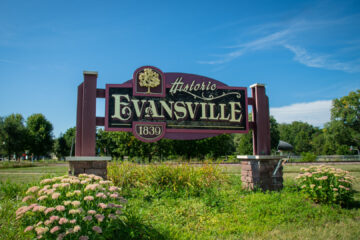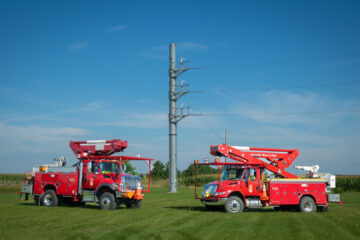January 03, 2024
Evansville continues to grow expectations
Member Utilities
This article was first published by MEUW Live Lines, Volume 73, Issue 1.
At Evansville Water & Light, the goal of service to the community has always been about combining the present with the past to make a better future.
“This city is such a mix of the old and the new,” said City Council President Jim Brooks. “There is a quest to continue providing reliability while also keeping the older, historical pieces. The people who make it all work know the importance of that.”
For more than a century, the municipally owned electric utility has been working to keep the lights on and continuously improve the infrastructure over time. One recent project in coordination with local business owners is tackling intermittent outages and other issues in a well trafficked area. Work has been underway to change overhead transmission lines running along an alley to underground lines in a northern section of the city’s downtown. The utility began evaluating the need for a change in 2011, then began adding loops to become more resilient.
“It’s good to grow expectations,” Brooks said. “Dedication and reliability have been the focus of the project over the last 15 years.”
The transition to automated metering for all of Evansville’s 4,200 electric meters has also been an ongoing upgrade for utility staff. The work began in 2015 and is nearly complete, despite the pandemic slowing the timeline.
“We’re looking forwar d to making that change,” said Brooks.
d to making that change,” said Brooks.
Energy Services Manager Darren Jacobson said with the implementation of automated meters the utility will also be employing the online customer engagement tool MyAccount, which is an online account center that lays out items like bills and electric usage and allows for real-time bill pay. The tool is managed through the membership of Evansville Water & Light in joint action agency WPPI Energy.
“MyAccount will be a huge benefit in helping people understand everyday energy use,” Jacobson said.
Evansville residents did not always benefit from the work of public power and a municipally controlled water supply. Evansville Water & Light began more than a century ago, after people voted for change. In 1885, proposals were created. These advocates shaped ideas for a planned public water and electric supply. Their aims were to better public health, improve local fire protection services and grow the area industrially. But these plans were not accepted by the village board of the time, falling to the wayside, but not forgotten by these proponents.
Cisterns continued to be used until 1901, when residents took to the polls to voice their desire for municipal utilities and take control of the electricity that they were just starting to use. Until then, the power was overseen by a company called Baker Manufacturing. In July of that year, citizens voted to create a public electric and water utility.
That step was the foundation of what the city continues to provide today, said Brooks.
“Reliable water and electricity for all of our residents; that’s what we have and what we will continue to supply for many years to come,” he said.
Today, Baker Manufacturing employs 150 to continue the tradition of building both municipal and industrial water system products, as it has since its founding in 1873. Brooks said today that the company continues to be a “great city partner.”
There is more industrial business in the small southern Wisconsin city. A much newer company came along in 1977, Harvard Corp. The company develops, manufactures and markets the best filter and purification systems for complex engines and manufacturing machinery and added a warehouse for its services in the mid-1990s.
The addition of companies continues. Evansville City Council members recently made public that a large soybean plant is planning to break ground in April. Once at its highest operation, the plant would add eight megawatts to the utility load.
“It would change the way the city looks, the way we act and would really bolster the utility,” Brooks said.
The city is changing already. Officials have finalized a plan for “Growing Our Parks: Recreation for Generations.” The public swimming pool, which had long outgrown its lifespan since being installed in 1958, has been removed. At the Leonard-Leota Park, a splash pad will be built instead. A neighboring park will become a waterpark. Nearby, new baseball and soccer fields will provide a space for safe and functional recreational events.
Residents are changing as well. Billing Clerk Donna Hammett said citizens are embracing solar power in what feels like a high number for a small city of just over 5,700 people. The utility serves 66 solar customers, most of which are homeowners, but also include a small array on a commercial business and panels at school buildings.
Hammett said people are likely trying to cut costs where possible and that has led to the increase. The addition of more companies going door to door to sell solar panels has gone up as well. They hope that residents reach out to the utility and ask questions so they know how adding solar panels to their roof will affect their bills.
And utility staff are available to answer questions, Hammett said.
“People move here, and they call expecting an automated voice,” she said. “Instead, they’re pleasantly surprised to hear one of us greet them on the phone and answer all the questions they have.”
It’s the personal connection that Hammett said she has been trying to amplify in recent years. In September, the utility held a customer appreciation event with food and prizes for everyone who attended. They hosted a drive for the local food pantry and not only donated 300 pounds of items, but also gave a $250 donation directly from the utility.
“We’re small enough where  we can reach out to the community,” Hammett said. “We can provide that human interaction.”
we can reach out to the community,” Hammett said. “We can provide that human interaction.”
Another part of the event was the demonstrations through partnerships with local businesses. Evansville Ford brought in electric vehicles for the 2023 event to help people learn more about how they work and if they would be a good option for them or their family.
Lineworkers were on hand to talk about their work. They “love talking about what they do,” Hammett said. A young person who attended the event voiced interest in becoming a lineworker and the crew of five spent more than an hour helping explain all the steps in education and what the job will require.
“That event is definitely worth it for those moments,” Hammett said. “If you have just one person interested in learning more about what could become a fulfilling career, or even just the gratitude from some of the people who attend.”
The lineworkers also put lights up during the holidays and take them down once the new year comes around. They hang banners on poles downtown for different occasions throughout the year, and in the summer, they water the flowers that hang there to beautify the city.
“The story of our work for the people, it’s a good story and we need to tell it,” Hammett said.
Celebrating the accomplishments of the utility is something they need to do more, Brooks said.
Evansville Water & Light consistently receives accolades for safety and their work to keep the lights on. Their lineworkers have received awards for their quick outage respo nse times. The utility has received the designation of American Public Power Association’s Reliable Public Power Provider multiple times, achieving platinum status for the three-year designation when it was most recently bestowed on the utility in 2021. It was also recognized via a Safety Award of Excellence for safe operating practices by the APPA that same year.
nse times. The utility has received the designation of American Public Power Association’s Reliable Public Power Provider multiple times, achieving platinum status for the three-year designation when it was most recently bestowed on the utility in 2021. It was also recognized via a Safety Award of Excellence for safe operating practices by the APPA that same year.
As a member of local government and recent chair of the APPA Policy Makers Council, Brooks is also a supporter of advocating at both the state and federal level to ensure lawmakers understand what is important to municipally owned utilities and their customers.
“It is important for each utility to advocate for themselves, and as part of WPPI Energy, our joint action,” Brooks said. “We owe it to each other to show up and build relationships with legislators. We can be the resource to help them learn about our issues and then they’ll think of us when a policy comes up and they need to consult on how they should move forward.”
The community has great longevity, Brooks said, and everyone is focused on working together to ensure the city thrives in the future.
